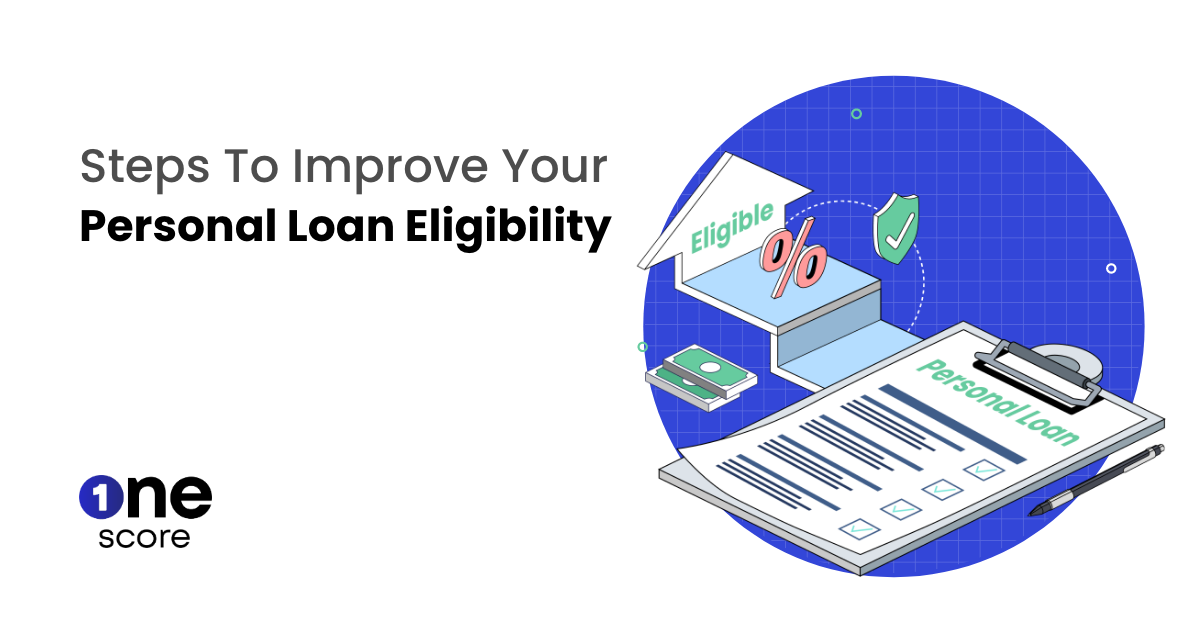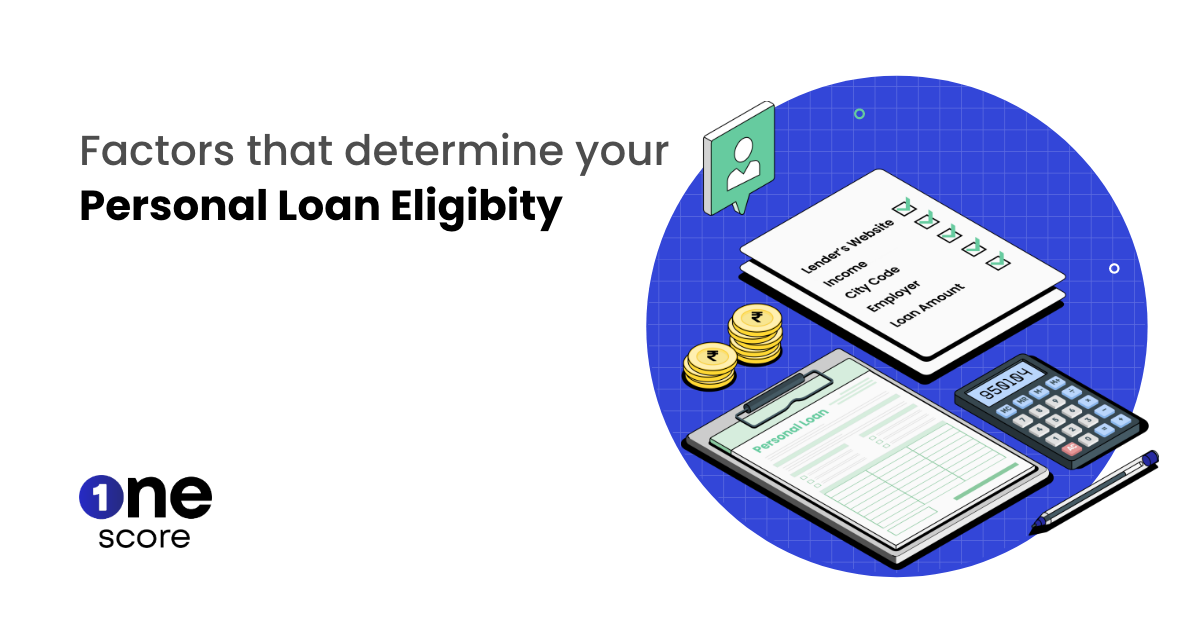7 Tips To Improve Personal Loan Eligibility

Personal loan eligibility is determined by lenders based on various factors. Every lender has certain eligibility criteria that borrowers must meet to become eligible for a personal loan. You can check your personal loan eligibility by visiting the lender’s site. After providing the required details, the lender’s verification team determines your eligibility.
Importance of Checking Personal Loan Eligibility
It is important for borrowers to check their personal loan eligibility to get their loan application approved without any hassle. A personal loan eligibility check helps borrowers avoid unnecessary hard inquiries.
-
Higher Loan Amount: If the lender feels that the borrower meets the set eligibility criteria, chances are that a higher loan amount might be sanctioned.
-
Lower Rate of Interest: Borrowers who meet the eligibility criteria stand a chance of getting a personal loan at a lower rate of interest.
-
Fast Approval and Disbursal: Borrowers with a strong credit history get their personal loan approved and disbursed faster. Being creditworthy expedites the processes of approval and disbursal.
What Factors Affect Your Eligibility for a Personal Loan?
Several factors can affect your eligibility for a personal loan. These factors can influence the lender’s decision to approve or reject the loan. It can also influence the rate of interest, loan tenure, and subsequent approval and disbursal. Factors affecting personal loan eligibility are mentioned below:
-
Credit Score: Borrowers with a credit score of 750 and above are considered creditworthy. Banks and NBFCs generally prefer to offer personal loans to such applicants. Borrowers with lower credit scores may be charged high rates of interest.
-
Employment Type: Among salaried and self-employed applicants, lenders prefer applicants with higher monthly salaries or self-employed individuals with a high turnover in business.
-
Employer Reputation: Further, among salaried individuals, those employed with MNCs or government jobs are given higher preference compared to those with jobs in start-ups or non-listed companies.
-
Age: Lenders favor loan applicants over 25 because they anticipate that they will have secure employment as opposed to older borrowers who are close to retirement or superannuation.
-
Repayment Capacity: Banks and NBFCs prefer loan applicants whose EMI/NMI ratio is not more than 50% or 55%, which may vary across lenders. This implies that their total credit card and existing loan EMI obligations must not exceed 50% of their total income.
Borrowers still uncertain about how to check personal loan eligibility or how to calculate personal loan eligibility, should check the preferred lender’s website for further information.
7 Tips to Improve Your Personal Loan Eligibility
Lending institutions look at various factors to determine your creditworthiness. Improve your eligibility for a personal loan by following the tips given below:
1. Check the Loan Provider’s Eligibility Criteria
Before applying for a Personal Loan, ensure you have checked the lender’s eligibility requirements. Doing that will avoid rejection due to trivial reasons like income or age.
2. Track Your FOIR (Fixed-Obligation-to-Income Ratio)
Spending a major percentage of your monthly earnings to pay for your existing financial obligations reduces your eligibility to secure a new loan. Eventually, it can lower your chances of getting loan approval, or worse, the lender may charge you a high-interest rate to compensate for the higher risk. Always maintain a FOIR below 40-50%. Pay off your outstanding credit card bills and liabilities to increase your chances of getting a new Personal Loan.
3. Avoid Applying for Several Loans at a Time
When you need emergency funds, you may apply to multiple loan providers to increase your chances of approval. But you must consider the fact that each application results in a hard inquiry on your credit report, which eventually reduces your credit rating and lowers your chances of approval.
4. Boost Your Credit Score
Financial institutions pay a lot of attention to your credit rating when evaluating your loan application. A credit score of 700 or above is considered decent for a loan application. The higher your credit score, the higher your chances of getting approval at favourable interest rates and terms.
5. Mention All Your Income Sources
To get approval, you must show the lender that you can repay the loan on time and without hassle. Instead of just providing the details of your monthly salary, furnish information about all additional income sources, such as rent, investments, hobbies, and part-time jobs. Doing that will boost your loan eligibility for a bigger loan amount at better interest rates.
6. Choose a Longer Repayment Tenure
Opt for a longer repayment tenure. It breaks down your loan cost into smaller EMIs that reduce your financial burden and help you make timely payments. It reduces your DTI ratio, ultimately increasing your repayment capacity and boosting your approval chances.
7. Enquire About Prepayment
You must enquire about any hidden charges and fees associated with the loan, such as prepayment charges, part-payment charges, etc. High prepayment charges can negate interest savings from early payments or refinancing. Being aware of these charges helps you make informed decisions, avoid traps, and align your loan with your long-term financial goals.
Additional Read: Improve Your Credit Score
How to Avoid Personal Loan Approval Rejection
Most personal loan applications get turned down by lenders for various reasons. E.g., The documents submitted by the applicant are inadequate, their credit score is poor, the borrower does not meet the minimum income requirement, etc. In such cases, the lender does not feel confident about the borrower’s timely repayments. As a loan applicant, borrowers must take certain measures to ensure that their personal loan application does not get turned down. Below are some of the measures you can take:
-
Maintain a Low FOIR: Lenders consider the Fixed Obligations to Income Ratio, or FOIR, one of the most crucial aspects in approving or rejecting an applicant’s loan application. If the borrower’s FOIR or debt rate is low, lenders consider your net monthly financial obligations to be lower than your income, which makes them confident about your repayment capacity.
-
Maintain a High Credit Score: Lenders check the borrower’s CIBIL score before approving a loan application. Thus, you must maintain a high CIBIL score at all times. A credit score of 750 and above increases the lender’s trust in borrowers and improves their chances of loan approval.
-
Be Careful with Credit Utilisation: Borrowers utilising multiple credit cards must limit their credit utilisation. They must split bills evenly among all their cards, as this reflects positively on their use of credit.
4. Show All Income Sources: If borrowers have multiple sources of income, they must disclose everything to lenders. Extra income boosts a borrower’s chance of getting a personal loan, bringing the rejection rate down considerably.
Frequently Asked Questions
- What Are the Common Eligibility Criteria for Personal Loans?
Here are some basic conditions that borrowers must meet:
- They must be Indian residents
- They must be less than 60 years old at the end of the loan tenure
- Their monthly net salary should be a minimum of Rs. 25,000
- They must have been employed for at least three years at their current job
- How Can I Improve My Credit Score to Boost My Personal Loan Eligibility?
There are several ways to improve your credit score:
- Pay credit card bills on time.
- Avoid multiple loan applications.
- Reduce credit utilisation ratio.
- Choose longer repayment tenure.
- Settle past dues immediately.
- Maintain a high credit mix in the form of credit cards and personal loans.
- What Is a Debt-To-Income Ratio? How Can I Reduce It to Improve My Eligibility for a Personal Loan?
Debt-to-income (DTI) ratio is the percentage of your gross monthly income that is used to pay your monthly debt. Your DTI ratio determines your borrowing risk. Loan applicants can lower their DTI by:
- Increasing the amount they pay towards their debts
- Asking creditors to reduce interest rates.
- Avoid Taking on more debt.
- Look for ways to increase their income.
- Will Having a Steady Employment History Increase My Chances of Getting a Personal Loan?
Yes, it does. Borrowers and loan applicants with a steady employment history have a higher chance of getting their personal loan approved. Lenders prefer such applicants as they are considered low-risk borrowers.
- Can Having a Co-Signer Help Me Qualify for a Personal Loan?
Having a co-signer increases a borrower’s chances of getting a personal loan approved. In the event of default, the co-signer assumes the responsibility of paying off the loan amount.
To stay informed on all things credit management and personal finance, Check Out OneScore.
**Disclaimer: The information provided on this webpage does not, and is not intended to, constitute any kind of advice; instead, all the information available here is for general informational purposes only. FPL Consumer Services Private Limited and the author shall not be responsible for any direct/indirect/damages/loss incurred by the reader in making any decision based on the contents and information. Please consult your advisor before making any decision.

- OneScore , August 22, 2023

